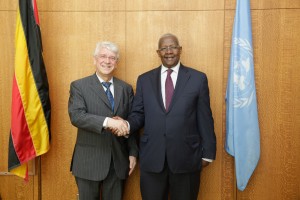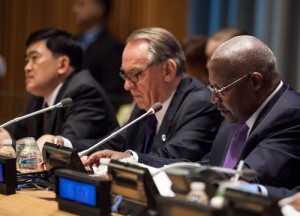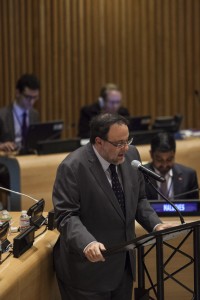New York, 8 May 2015
Statement Attributable to the Spokesperson for the President of the General Assembly
Yesterday, a High-level Thematic Debate, in support of the preparatory process for the 2016 Special Session of the United Nations General Assembly (UNGASS) on the World Drug Problem, was organized by the General Assembly in close cooperation with the Commission on Narcotic Drugs (CND).
In his opening statement, the President of the General Assembly (PGA), H.E. Mr. Sam Kahamba Kutesa, reminded participants that “no country or society is immune from the menace of illicit drugs and their attendant
effects. The world drug problem does not discriminate rich from the poor, although the poorest and most vulnerable in our societies are the worst affected”.
The PGA recalled that “drug trafficking is a multibillion dollar enterprise which has infiltrated societies, governments, and national and international institutions, including those that are responsible for its control”. He noted that “worldwide, annual proceeds from the illicit drug market are estimated to be around US$ 322 billion”.
The PGA said that “people must be at the centre of all our efforts and we must do what we can to support and empower them to overcome their vulnerabilities, which exposes them to illicit drugs and crime. This underlines the importance of integrating crime prevention and criminal justice into the post-2015 development agenda”. The PGA went on to say that “resources directed at this problem could have been more effectively utilized for development”.
Scaling up international cooperation
Participants noted the need to focus on prevention, treatment and care of affected persons to alleviate pain and suffering; the implementing of alternative development strategies, and the need to scale up international cooperation, including the full implementation of the three drug control Conventions. The link between illicit trade in drugs, terrorism and the spread of weapons was also stressed.
The Deputy Secretary-General (DSG), H.E. Mr. Jan Eliasson, underscored the importance of consolidating approaches and integrating a range of perspectives on drug issues. He recalled that the drugs trade poses a threat to peace and security at the national, regional and international levels. He reminded the audience that “criminal networks which thrive on the drug trade are threats to strong, stable societies. Organized crime undermines institutions, feeds corruption and obstructs democratic governance”.
The DSG stated that “this despicable trade fuels violence and instability – threatening hard-won progress on peace, development, respect for human rights and the rule of law”. He emphasized that ‘at the international level the ever stronger links between transnational organized crime, terrorism and extremist violence constitute a very serious new threat”.
Participants were reminded that people who use drugs face special barriers, burdens, traumas, discrimination and stigmatization, which include the negative effects of serving lengthy prisons sentences for minor drug offences. It was emphasized that focus on public health, prevention, treatment and care – as well as on economic, social and cultural effects and strategies – can provide a viable approach to the problem.
The event took place ahead of the 2019 target year for the implementation of the Political Declaration and Plan of Action on International Cooperation towards an Integrated and Balanced Strategy to Counter the World Drug Problem. It also took place in the wake of the 13th United Nations Congress on Crime and Criminal Prevention in Doha, which emphasized a comprehensive and balanced approach to supply and demand reduction strategies.
PGA holds bilateral
Ahead of the plenary meeting the PGA chaired meetings on 8 May 2015, regarding the “Resolution on the Report of the International Criminal Court (ICC); Financing for Development (FfD) Modalities; and the Joint Inspection Unit (JIU) confirmations”, H.E. President Kutesa met with the Honourable Senator Mark Golding, Minister of Justice of Jamaica. Senator Golding welcomed the PGA’s initiative in convening the plenary meeting, and in so doing, providing Member States with the opportunity to exchange views on related matters. The President and the Minister also discussed the priorities of the 69th session, such as the Post-2015 Development Agenda, the revitalization of the General Assembly and the reform of the United Nations Security Council.

President Kutesa and Mr. Axel Bertuch-Samuels, Special Representative of the International Monetary Fund (IMF) to the UN. Photo/Martin Dixon
President Kutesa also met on 8 May with Mr. Axel Bertuch-Samuels, Special Representative of the International Monetary Fund (IMF) to the United Nations. They discussed the Post-2015 Development Agenda and the Financing for Development (FfD) process.

President Kutesa and H.E. Mr. Matthew Rycroft, Permanent Representative of the United Kingdom to the UN. Photo/ Martin Dixon
Later during the same day, the President of the General Assembly received H.E. Mr. Matthew Rycroft, new Permanent Representative of the United Kingdom to the United Nations.
The PGA also met with Under-Secretary-General Adama Dieng, Special Advisor to the Secretary-General on the Prevention of Genocide.



